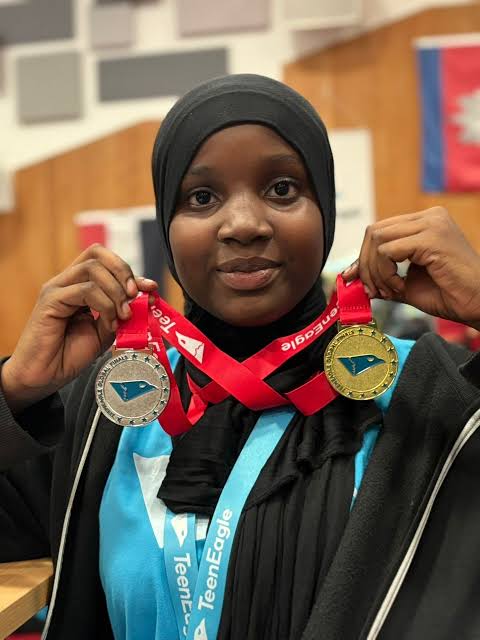
Samuel Omang
The Federal Government, through the Ministry of Education, has honoured 17-year-old Nafisa Abdullah Aminu, who emerged as the World’s Best in English Language Skills at the 2025 TeenEagle Global Finals in London.
In recognition of her achievement, the Minister of Education, Dr. Tunji Alausa, presented Nafisa with a cheque of N200,000 at a ceremony in Abuja.
The event was attended by dignitaries including the Minister of State for Education, Prof. Suiwaba Ahmed; Yobe State Commissioner for Basic Education, Prof. Abba Adam; senior officials of the Federal Ministry of Education; and representatives of the Yobe State Ministry of Education. Five other category winners from the competition were also present.
Commending Nafisa, Dr. Alausa described her feat as a testament to the brilliance and resilience of Nigerian students. He said the global recognition underscores the need for sustained investment in education and opportunities for young people to showcase their potential internationally.
He assured that the Federal Government remains committed to promoting academic excellence through scholarships, mentorship programmes, and improved access to quality learning resources. According to him, Nafisa’s triumph should inspire other students to pursue excellence with dedication and discipline.
Prof. Abba Adam, Yobe State Commissioner for Basic Education, hailed Nafisa and her peers as “Amazons” and symbols of resilience, noting that their success represents both personal achievement and the collective progress of a state rebuilding its education sector after years of insurgency.
“Today, we are celebrating victory,” he said. “A victory of resilience, and a victory of a governor who believes in the power of education as the key to the future of his people and the state.”
He highlighted Yobe State’s recent milestones in education, including the graduation of 171 state-sponsored medical students from universities in India, now serving in hospitals across the state. He also noted that the state’s colleges of education, agriculture, and business studies had been upgraded to strengthen teaching, research, and training.
In her remarks, Nafisa expressed gratitude to her parents, teachers, and the Nigerian government for their support. She pledged to use her platform to inspire other students and urged Nigerian youths to embrace hard work, perseverance, and confidence in their ability to compete globally.
She also unveiled her project, English Language for Peace and Development, an initiative aimed at promoting literacy, dialogue, and social cohesion among young people.
Nafisa’s remarkable achievement reflects the growing talent and determination of Nigerian students on the global stage, highlighting the impact of education policies that nurture young minds and encourage international competition.
However, critics have slammed the Federal Government for the tokenistic nature of the reward. N200,000 for an international academic triumph is widely seen as disproportionately small, particularly when compared with the generous sums awarded to sports heroes, such as the Super Falcons and D’Tigress, who received gifts of 100, 000 dollars and houses from the same federal government, outside their bonuses, for representing the nation on the global stage.
Many education advocates argue that this disparity exposes a worrying trend: while athletes are celebrated and lavishly rewarded, young scholars achieving global excellence in academics are given symbolic gestures that fail to reflect the true value of their achievement or the years of hard work behind it. This has sparked debates on whether the government truly prioritizes education as much as it does sports.
